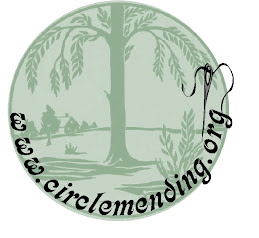"What does music have to do with genealogy?" I am frequently asked. Well, tonight the answer became very clear to 14,000 people who were at the Tabernacle Choir's performance at the Salt Lake LDS Conference Center. Oh, my! Just walking into the place was a moving experience (I always tear up when I'm there to hear the choir sing . . . it just does something "to" me . . . and I'm not much of a crier, but tonight went into major crying jags 3 different times!).
The performance was called "A Celebration of Family History" and featured a combination of music, stories, and talks on family history. Without the music, there would have been a significant lack of emotional impact. Without the music, much of the message would have been lost. I am convinced that our ancestors' lives, like ours, would have similarly lacked emotional impact and altered or lost messages at certain times if the music had been omitted.
Watching the story of Jared McCloud and his interest in the instrument of his heritage - the bagpipes - becoming a life-long passion served to communicate the message that our ancestral blood runs deep and a love for music can and does transmit across the generations while binding people to their cultures. At the end of the film about his experience, narrated by his father, Jared is seen playing "Amazing Grace" . . . but then the choir joined his on-film playing. On the screen, the image of Jared is replaced by the close-up of bagpipers playing "Amazing Grace" alongside the choir and the close-up of one of the pipers bears the identification: "Jared McCloud." The audience just stood as if on cue . . . the performance was magical, the emotion unmistakable. And the connection to heritage universal (at least within the group there).
The last film vignette was a brief version of the story of Julia Ward Howe's experience in writing "Battle Hymn of the Republic," narrated by a g-g-g-grandson (I may be off by a "great" there). His interest in the life of Dr. Martin Luther King, Jr. seems to be a natural continuation of the abolitionist background of his ancestor. Again, as the film ended, the choir, along with the Orchestra at Temple Square, picked up the cue and performed the timeless piece. As they sang, the background behind the choir changed from orange to red and blue with a display of white stars on a blue field . . . could there have been a dry eye in the audience? Again, we were on our feet to recognize the talent and message. At the end, Mack Wilberg, the conductor, turned and "conducted" us as we joined in with one last chorus with the choir. It was positively overwhelming!
That was the last piece and the audience applause went on for quite some time . . . but it was time to leave. As we all picked up our things and started the mass exodus, Richard Elliott, the organist, played a John Philip Sousa march, both a fitting encore and a good vehicle to get (and keep) us moving steadily towards the exits. No pushing. No shoving. Just a sense that we had all shared in an unforgettable evening.
Music does that: it joins people together. It creates a unified group, even when that group consists of people from all walks of life, different cultures, different generations, different religions . . . together we understood the relationship between the music and family history. These were our ancestors' songs . . . they are also ours. The wedding dress great-grandma wore is long gone. The model T my grandfather bought to take my dad on his first camping trip never even made it into a photograph. The photos that my parents had in the storage locker that caught fire can never be enjoyed by my kids. But the music is still with us. The songs my mother sang at camp are the ones I sang. The hymns grandma and grandpa sang at church are still sung by congregations today. The lullabies that I learned from my father were sung by my children to their children and, most likely, are being sung to their children now. We can keep our ancestors alive through the music that was part of the fabric of their lives. Tonight was yet another demonstration of this and it was so worth dealing with my crowd-phobia, the snow and cold, and the long walk to my friend's car for the ride back to the campground. What a night!
Subscribe to:
Post Comments (Atom)









No comments:
Post a Comment
Please keep comments related to this post or topic; others will be deleted. Contact blog author directly for other issues.